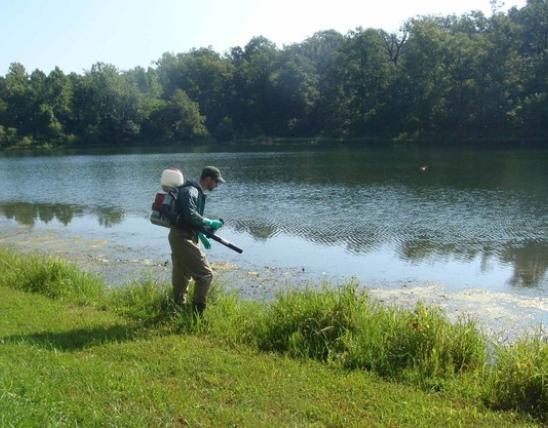Michael who?
Not even close--Missourian Denny Brauer was 1998 Angler of the Year on the professional bass fishing tour and is the first outdoor-person ever featured by Wheaties on their "Breakfast of Champions" cereal box.
Not bad for a kid who taught himself to fish and who discovered that he had a talent for catching bass that not only left other anglers bobbing in his wake, but that also makes him a fine living--he is the career top money winner on the B.A.S.S. circuit at about $1.5 million.
He learned much of his trade on what he thinks is the best bass lake in the country, Lake of the Ozarks. "It's amazing how it holds up year after year," he says. He can be on the water in minutes from his Camden County home.
There's a wrought-iron bass on the gate fronting the home that is set well back from a county highway on 500 acres. A dozen gobblers often strut on the back lawn, and the rolling, wooded Ozark hills stretch away far to the south.
Brauer and his wife, Shirley, love the home but don't spend much time there. The pro bass tour is demanding, and when he's not fishing tournaments, he's at sports shows giving fishing seminars or otherwise involved in the business of fishing.
It's a big business. He has designed a lure that is the current top seller nationwide, and he has business ties with an array of outdoor marketers, from automobile dealers to catalog outfits.
The Wheaties' tie-in came about because of the Angler of the Year honor. General Mills had agreed that whoever won the title would be featured on the cereal boxes, in company with 75 years of other athletes from Mary Lou Retton to Michael Jordan.
"Boy that got me fired up," Brauer says. "I fished as hard as I could. It was definitely something I went after and everything worked out right." Brauer won four major tournaments in 1998, including his 16th try at the Bass Masters Classic, the World Series of bass fishing. "It was a wonderful year. Everything came together and because of the successes in 1998 and previous years, it's given me a chance to be an ambassador for bass fishing," Brauer says.
But the animal rights group People for the Ethical Treatment of Animals (PETA) protested. Ingrid Newkirk, president of PETA, said, "Anglers have no place next to real sportsmen like Michael Jordan and Tiger Woods, who better represent the breakfast of champions."
Brauer, characteristically diplomatic, said he first was shocked by the protest, but adds, "Every media interview was positive. Everybody was behind the sport of bass fishing and thought the protest was absolutely ridiculous. By the same token, it's neat we live in a country where everybody can peacefully express their opinions. And they did and we expressed ours. It focused attention on fishing. There are lots of mothers and fathers sitting at the breakfast table with that cereal thinking, 'maybe I'll take my kid out fishing.'"
For the average angler, fishing is a hit or miss situation. Either they hit or they don't, and if they don't, it doesn't hit them in the pocketbook. Not so with a top tournament angler. Brauer equates tournament fishing with "a giant puzzle--the one who puts the pieces together the fastest is the winner. I think experience is a valuable teacher." Today he and his son Chad are in business together, but also often compete against each other in tournaments. Brauer thinks he has a slight edge because of experience but figures it's only a matter of time before Chad catches up.
Professional fishing, like some other pro sports, especially golf and basketball, has burgeoned in recent years. "There are more companies outside the fishing field that are sponsoring tournaments," Brauer says. "So more money is flowing into the sport."
Fishing is considered a "life sport," one that can be enjoyed by anyone at any age. But can a pro go on forever? "I guess we're the guinea pigs," Brauer says. "We're the first generation of pro anglers. I just turned 50 and I have a lot more aches and pains after a day's fishing than I used to, but I also have just as much willpower as I ever did. Fishing can be strenuous, but if you take care of your body and try to work out and be aware of how you can hurt yourself in rough water, I think you can fish for quite a few years.
"As long as I have that drive and continue to learn and gain knowledge, I think that compensates for what I lose physically."
The wear probably is more psychological than physical. Travel is integral to pro fishing--tournaments jump from one end of the country to another and Brauer is constantly on the road. "Mental burnout can happen in a hurry if you're not having success," Brauer says. "It helps that I have so many things going that I don't get to fish as much as I'd like, so I have a fresh attitude when I get to a tournament. In the early '80s, I'd guide for 20 to 30 days between tournaments. If I'd kept that pace up, I think I'd be burned out by now."
Brauer thinks he eventually will cut his tournament fishing to one circuit, rather than two, and continue working with a television show ("Bass Class" on ESPN) and with his various sponsors. That'll leave more time for fishing with grandson Colby in the pond behind the house.
Brauer was born in Nebraska and moved to Missouri in 1981. His father died when Denny was only four, which left him and his brother and sister without a male family figure--a common situation today.
"We moved to Seward, Nebraska," Brauer says. "We had a small stream about 300 yards from the house. We fished for anything that would bite. When we got a little older, we'd ride our bikes to some of the farm ponds, and that's where I started to fish for bass."
An uncle occasionally took the youngster fishing, but basically he was self-taught. "It's important to have someone to help in the beginning and the opportunity," Brauer says. "If I hadn't had that stream right where I lived I might never have generated that interest. It's hard to get fishing opportunity in the middle of a metropolitan area. We need to make sure that every youngster can be exposed to fishing because it is such a great pastime."
By the time he'd reached 25, an age when career choice is an imperative, bass fishing had become a passion rather than a hobby. "I turned a hobby into a profession," he says. "I started fishing bass club tournaments in 1976 and had success and decided to try the next level and was halfway successful my first few tournaments, so I went from there." He fished his first professional tournament in 1980 and went fulltime professional in 1982.
It is a chancy and occasionally dangerous life. In addition to the 50,000 or more highway miles every year, there are the rigors of weather. Brauer recalls a sudden storm that blew up when he was far from the dock on a New York lake. "The waves were maybe 15 feet high," he says. "It looked like the ocean." He made it back to the dock, but because of the heavy water was late for the weigh-in and didn't place in the tournament. He isn't as daring now as he was as a young buck. Recently in an Alabama tournament, he opted to fish sheltered from the wind even though he knew a windswept area held bass. Sure enough, the anglers who fished the windy spot caught more fish.
Aside from wind, lightning and other foul weather phenomena, submerged logs and other debris also can be a hazard.
But travel remains the most wearing part. "When I first started, it was interesting because I was going to new parts of the country and new lakes, but now we've been almost everywhere and the highways are crowded. Traveling is not as much fun, but fishing is--in fact some places the fishing is better now than it was then."
Brauer thinks that's because of better fisheries management and the increased emphasis on catch-and-release. He doesn't keep bass, but has no quarrel with someone who wants to keep a bass for eating or, in the case of a trophy, to mount on a wall.
Brauer is seeing more youngsters at his seminars. "They now want to become professionals," he says. He advises any youngster interested in becoming a professional angler to go for it. "I never tell these youngsters that they can't. I started with nothing. It's never money that separates people from having success. It's willpower and determination. I look in some of these youngster's eyes and what I see is that they're going to be successful."
You look in Denny Brauer's eyes, slightly reddened from wind and water and sun, and you see a faint fire that does not bode well either for bass or for his fellow competitors. He figures if that Jordan guy and his team could repeat as world champs in basketball three times, a "threepeat," why not a pro angler.
He's a third of the way there.
Flippin'
Denny Brauer's favorite type of fishing is "flippin'," the technique of pitching a lure into a small hole in heavy cover--weeds or brush. He favors jigs (he designed the Strike King Pro Model jig). "It's the number one selling bait all across the country," he says. "But there are times they don't bite it, so I'll go to a tube in natural color or a spinner in white or chartreuse." The lures have weed guards--of course, designed by Brauer--to minimize hanging up in vegetation or brush.
Water clarity determines color and size--three-eighths ounce most of the time or half-ounce in thick vegetation or when fishing deep. In clear water, he chooses brown and other natural colors. If water is stained, he goes to black and blue. "If an angler is indecisive, I always tell him to put on black and blue because it'll catch fish in all conditions."
He tips his jigs and tubes with a small pork trailer in cold weather and a divided pork trailer in warm weather. He lets the lure settle to the bottom, then retrieves it with a jigging motion, the speed of which is determined by water clarity and temperature.
He usually uses a long rod--7 1/2-feet--that he designed himself and a bait casting reel, with 25- or 30-pound test monofilament with the lure tied directly to the line. The secret, he says, is to get a bass out of the heavy cover, thus the stout line.
Regardless of experience or equipment, there are times when bass simply sulk, but if Brauer had to pick the ideal day, he has it defined: "You get a warm spring day in late April or early May, water temperature moving up to 70 degrees, 5 degrees either way, 80 degree air temperature, little bit of wind, cloudy and muggy with a front moving in . . . you'd better hang on!"
And More...
This Issue's Staff
Assistant Editor - Charlotte Overby
Managing Editor - Jim Auckley
Art Editor - Dickson Stauffer
Designer - Tracy Ritter
Artist - Dave Besenger
Artist - Mark Raithel
Photographer - Jim Rathert
Photographer - Cliff White
Staff Writer - Jim Low
Staff Writer - Joan McKee
Composition - Libby Bode Block
Circulation - Bertha Bainer






















